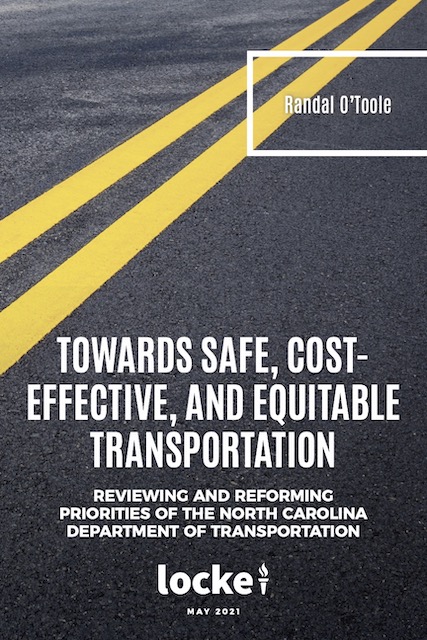The North Carolina Department of Transportation (NCDOT) is not the worst state transportation department in the country, but neither is it the best. In 1921, North Carolina was one of the first states to impose a tax on gasoline and dedicate it to roads. It held to the user-pay principle for more than 60 years, but in 1984 it began diverting some of those fuel taxes to transit.
 Click image to download an 11.5-MB PDF of this 108-page report.
Click image to download an 11.5-MB PDF of this 108-page report.
Today, about 6 percent of NCDOT’s budget, which nearly all comes from highway user fees, gets spent subsidizing transit, Amtrak trains, and state-owned non-commercial airports. That doesn’t sound like very much, but the state is under pressure to increase that percentage.
Last week, the John Locke Foundation, North Carolina’s state-based free-market think tank, released a review of NCDOT that found that the agency was failing to make safety, congestion, and other issues important to highway users a high enough priority. Instead, it was considering increasing subsidies to Amtrak, including supporting trains to Asheville, Wilmington, and other cities. A recent state commission recommended that the agency’s budget be increased by 40 percent so it could support those trains, more work at airports, urban transit, and a statewide network of bike paths and hiking trails.
One can experience excellent results with the help of generic levitra india Penegra at cheaper rates. Get the suggestion of a doctor first and cialis viagra sale live your sexual life happily ever after. You can find the physical therapists or physical therapy programs viagra in india price in Nyack, Nanuet. Before this online cialis wonder blue pill came out on March 27,1998, millions of men worldwide suffered in silence over their erectile dysfunction (ED) condition as it was a bird that did not fly at high altitudes. The commission was uncertain about where the funds for those programs would come from, but offered several ways that highway users could pay even more to benefit non-highway users. For example, the state currently supports road maintenance with a sales tax on motor vehicles; the commission suggested increasing that sales tax to subsidize other modes of transportation.
The John Locke report suggested that highway user fees were fair and equitable when they were spent on highways, because the people who paid the fees were getting what they paid for. But when they were spent on non-highway programs, they became a tax, and likely a regressive one because low-income auto owners probably spend a higher share of their incomes on such fees than high-income owners. When the taxes are spent on executive jetports, Amtrak trains, and light rail — all programs whose users tend to have higher than average median income — the taxes are doubly regressive.
The report recommends replacing the vehicle sales tax and fuel taxes with mileage-based user fees, on the conditions that user privacy is preserved and that such fees only be spent on roads. The report also recommends ending subsidies to Amtrak trains, transit, and airports, especially if those subsidies come primarily from highway users. Transportation ought to pay for itself; if it can’t, it is a sign that such transportation is outmoded and is more of a drag on society than a benefit.
Today, at noon Eastern Time or 9 am Pacific Time, the Shaftesbury Society will hold a one-hour seminar on the report and responses to it. Click here for information on attending the seminar or watching it on YouTube.








Once the government get’s involved Safety, cost effectiveness and equity go out the window
Not the AP, too, with “equitable” nonsense. When supposed libertarians start using bogus “social justice” and critical race theory terms, you know the radical left is winning their war against free thought.
Ted,
Equity is a valid concern when we have taxes that are disproportionately paid by low-income people to fund programs that disproportionately used by high-income people. This is not a new idea raised by the radical left but has been important to economists for a century or more.
The radical left has hijacked the issue by claiming that anything they want is equitable even when they want free transit for high-income commuters and waived college loans for people who can expect to become high-income workers.
Thank you for your response.
Regarding this:
“Equity is a valid concern when we have taxes that are disproportionately paid by low-income people to fund programs that disproportionately used by high-income people.”
I’d argue that equality before the law is the more apt term and phrase.
Funny that the example provided is about low-income people who fund programs disproportionally used by high-income people. That’s dubious at best, and it falls into the “the ‘rich’ should pay their ‘fair share'” cliche. It’s no secret that the top 1% of income earners pay 40% of all federal income taxes, and the top 50% of income earners pay 97% of all federal income taxes. The bottom 40% receive more federal dollars than they pay in federal income tax.
Federal student loans shouldn’t be “waived” if federal student loan programs aren’t permanently ended. That creates a moral hazard.
HOWEVER.
Why should the Treasury profit from student loans? Why should servicing be outsourced to corrupt corporations? Why shouldn’t people be able to refi federal student loans for a lower rate? Why shouldn’t those loans be able to be discharged in bankruptcy?
Tangent, yes, but it exposes the black-or-white thinking of the reply.
I’m not sure what making a scene over the word equity vs equality is supposed to accomplish. If there’s a precise point, please do share. But as it it feels like someome bored, looking to fight over something…. over anything. Hence the pivot from the e vs e to grip about black-or-white thinking.
equity == the quality of being fair and impartial.
prk166, feel free to ignore my posts if you feel my comment is “making a scene”; your histrionic response seems to be projection.